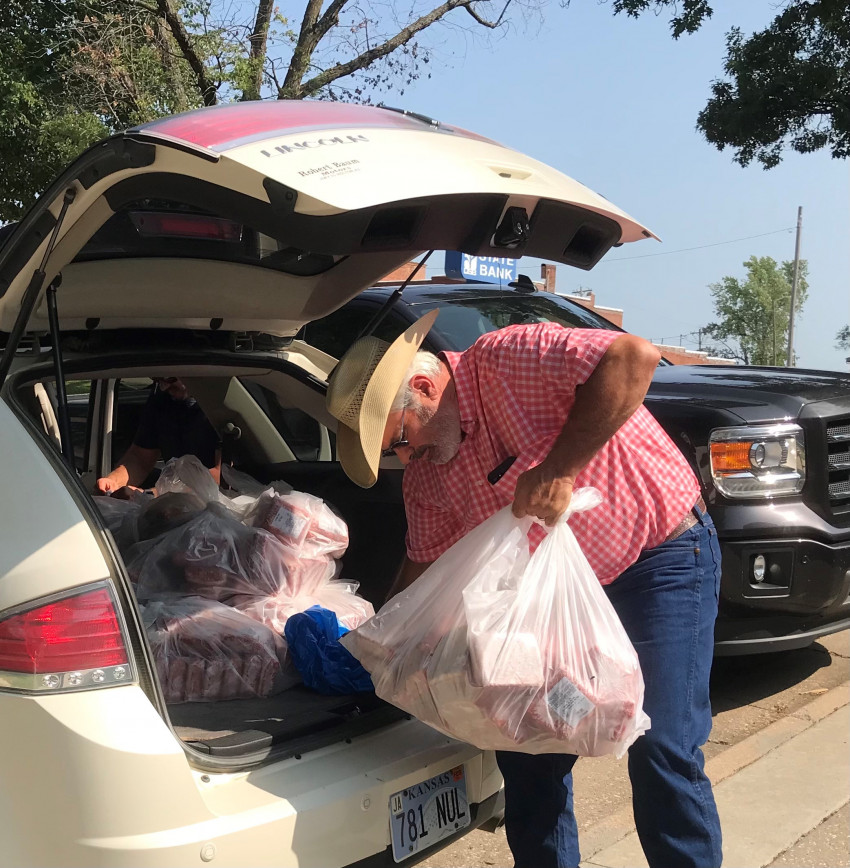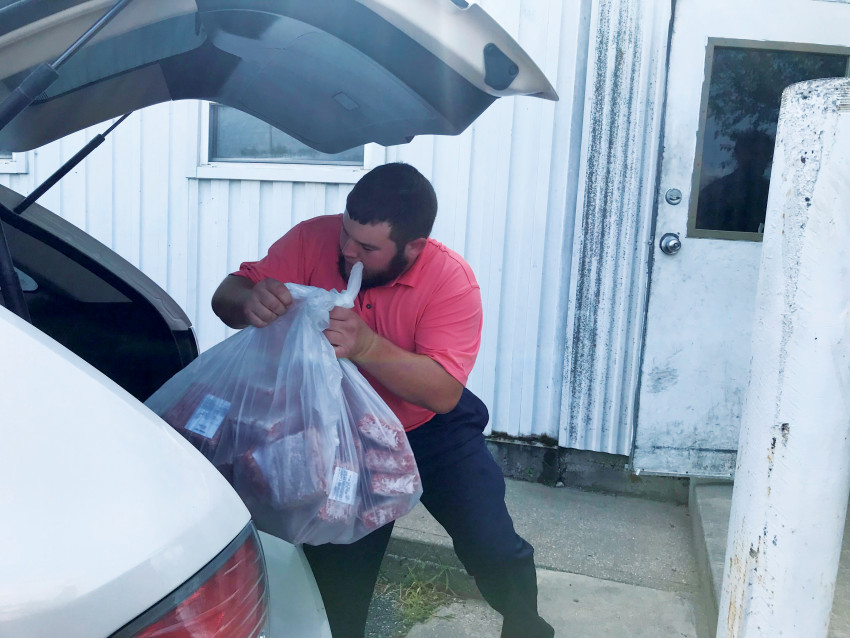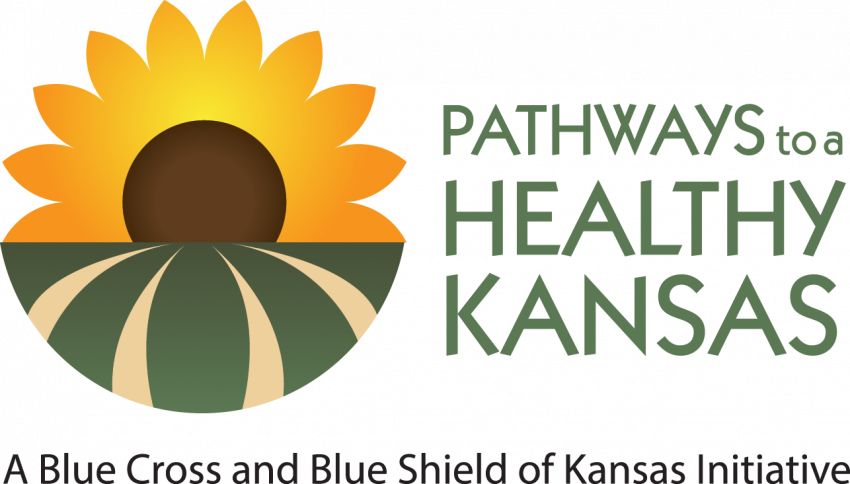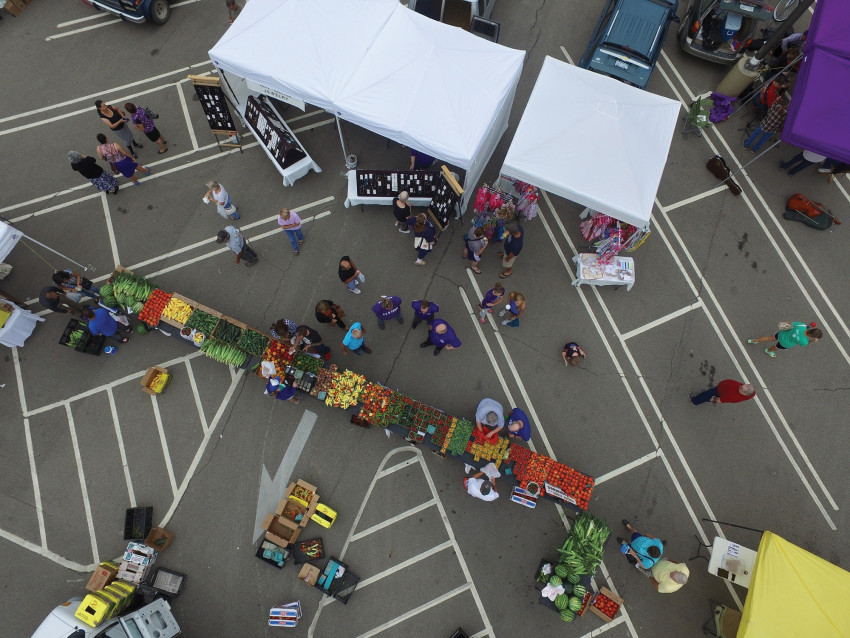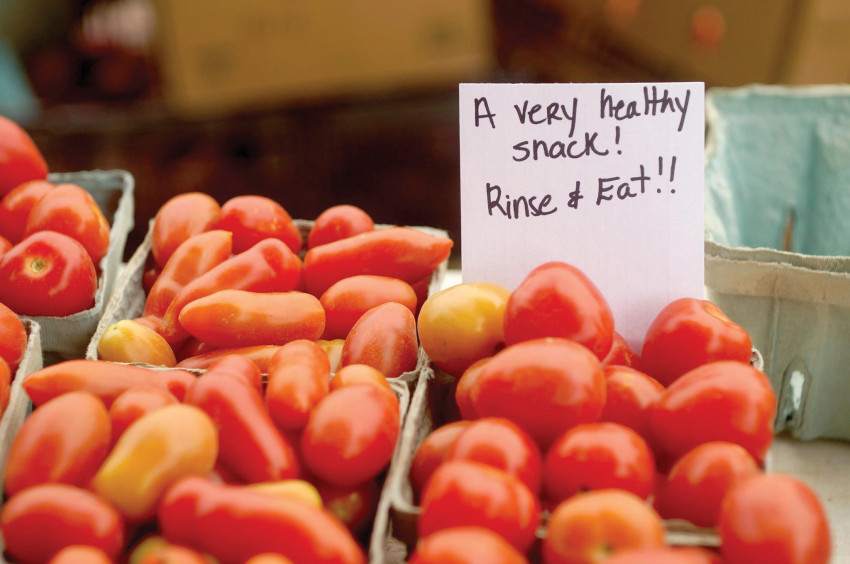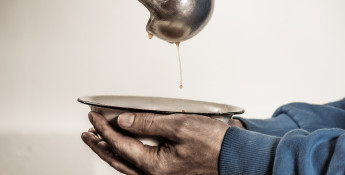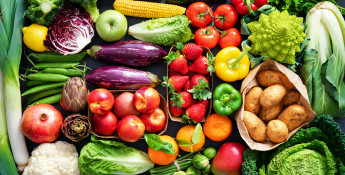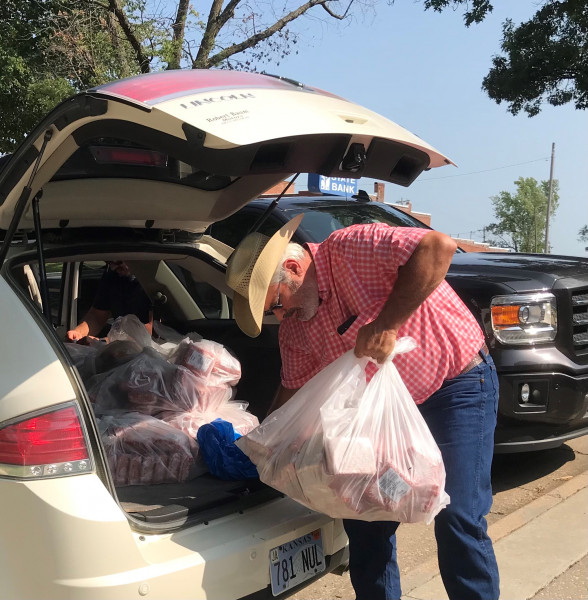By Sheridan Wimmer on November 17, 2021
Kansas Farm Bureau's End Hunger Fund Helps At the Local Level
Grant dollars provide local impacts for food insecurity efforts

Access to adequate, healthy, affordable food isn’t a new concept. It’s something every family strives for — to meet the nutritional needs of our kids and ourselves. What was new to many of us was the onset of a pandemic in 2020, how it impacted our food supply and how families found access to food. Through its End Hunger campaign, Kansas Farm Bureau (KFB) hoped to ease the impact COVID-19 had on many Kansas families.
MATCHING FUNDS
According to Feeding America, 15 million children and 45 million people had limited availability or were uncertain about the availability of nutritionally adequate and safe foods last year. As the state’s largest farm organization, KFB knew its work to help those experiencing food insecurity needed to be front and center through the COVID-19 pandemic and beyond.
“With or without a global pandemic, it’s important all families have access to food,” Terry Holdren, CEO of Kansas Farm Bureau, says. “COVID-19 will have long-term impacts on the economy, and there’s going to be more people who may have difficulties when it comes to adequately feeding themselves and their families. This is an opportunity to help them.”
Phase one of the campaign focused on a partnership with Farm Bureau Financial Services (FBFS) to encourage county Farm Bureaus and FBFS agents to contribute to the fund, then KFB’s Foundation for Agriculture matched their donation. The effort raised nearly $100,000 that went to 148 locations to deliver food relief in all 105 counties across the state.
“We welcomed the opportunity to team up on this project to provide some hope in an uncertain time,” Michelle Hubert, regional vice president of FBFS, says. “Farm Bureau Financial Services stands strong on helping Kansas communities thrive.”
HUNGRY FOR MORE
The generous support and success of the first phase of End Hunger brought a second opportunity. The second phase of the program aims to provide grant funding for county Farm Bureaus and local FBFS agents to develop projects in their communities.
“We were thrilled with the success we saw in phase one,” Holdren says. “This second phase will provide the same opportunities while also offering added flexibility to tackle specific hunger issues in communities head on.”
Two county Farm Bureaus that participated in phase one have been awarded grant dollars in the second phase for their innovative ideas to help food insecurity in their communities.
FILLING THE FREEZERS
In northeast Kansas, Jackson County Farm Bureau coordinator Donna Ashcraft said her board of directors wanted to continue the work her county association and agents started in the initial campaign.
“We participated in phase one of the matching donation program but wanted to get our members more involved in phase two,” she says. “We had been discussing what we could do and started talking about purchasing 4-H livestock. A board member said, ‘Why don’t we take advantage of the premium we offer for the 4-H animal, have it processed locally and donate that to the food pantry.’ Everybody loved the idea.”
The project was set in motion and Ashcraft visited with the local FBFS agents, who were all supportive of the idea of “Filling the Freezers” — the name of the project funded through KFB’s End Hunger grant.
“The three agents each contributed to the effort, and they eagerly agreed to work with us,” Ashcraft says.
The county Farm Bureau and FBFS agents — Rob Wareham, Mitchell Nicol and Casey Patterson — purchased a steer at the 4-H livestock sale, paying the floor price and the premium. The steer was processed locally and packaged into one-pound servings of ground beef that went to the JCMA New Hope Center Food Pantry.
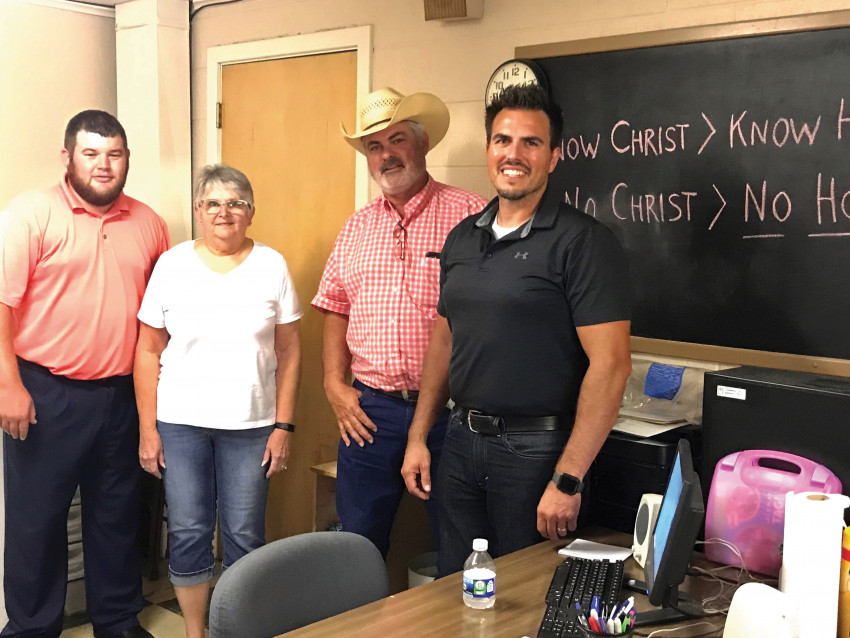
Garrett Holaday, Jackson County Farm Bureau President; Sarah Bahner, JCMA New Hope Center Food Pantry Director; Rob Wareham, Farm Bureau Financial Services Agent; and Casey Patterson, Farm Bureau Financial Services Agent are helping food insecurity projec
“Farmers and ranchers know how important it is for all families to have access to safe, nutritious food,” Garrett Holaday, Jackson County Farm Bureau president, says. “We are excited to be a part of the solution.”
“We’re advocating for agriculture by doing this public service because we’re offering this food we grow and nurture to those who are in need,” Ashcraft says. “People see that we’re producing food not just for profit, we’re producing it for the good of others, too.”
Filling the Freezers is expected to provide nearly 2,400 servings of fresh, local, nutritious protein to Jackson County community members.
HEALTHY FOOD PRESCRIPTION PROGRAM
Three years ago, Riley County and the City of Manhattan jointly appointed the Manhattan Food and Farm Council. Since then, many partnership initiatives have helped increase avenues of food access for neighbors in the community.
“The Food and Farm Council’s purpose is to serve as the local food system communication, advocacy and education network of partners,” Vickie James, registered dietitian and coordinator for the Farm and Food Council, says. “Together we tackle food issues that are too challenging to resolve independently.
“Our three focus areas are reducing food insecurity by increasing access to healthy food, reducing food waste and increasing education for things like food skills, food safety and healthy eating.”
The Food and Farm Council is a partner of the Flint Hills Wellness Coalition. Its mission is to create a healthy, equitable community through policy, systems, environmental and personal change. It was this coalition that took the initial leadership role to apply for, and was ultimately awarded, a grant through Blue Cross and Blue Shield of Kansas called “Pathways to a Healthy Kansas.”
“The Pathways to a Healthy Kansas grant is structured with the opportunity to select different packages of work that fit the challenges and needs in your community,” James says. “For Riley County and the Food and Farm Council network of partners, that meant one of the actions taken was setting in motion efforts to make sustainable changes in our food system.”
One sustainable change the coalition focused on was increasing opportunities for people to eat more fruits and vegetables. Data from the Centers for Disease Control and Prevention suggests eating a diet high in fruits and vegetables can reduce the risk of heart disease, cancer, inflammation and diabetes. However, some struggle to eat the recommended 2 ½ cups of fruits and vegetables per day. Kansas Health Matters and Kansas Department of Health and Environment reports 42.5 percent of Riley County’s adults eat less than one fruit serving per day. They also report 23.3 percent of adults eat less than one vegetable serving per day.
“Because of this data, and our focus on both increasing fruit and vegetable consumption and supporting local agriculture, four program partners came together with the Council to create the Healthy Food Prescription Program,” James says. “Partners include the Riley County Women, Infants and Children Nutrition program (WIC), Pawnee Mental Health Adult Rehabilitation Program, Kansas State University Lafene Student Health Center and the Manhattan Downtown Farmers Market.”
The Healthy Food Prescription Program can help create sustainable solutions to help everyone in Riley County eat more fruits and vegetables. To sustain the program, many ongoing funding sources are needed beyond the Pathways to a Healthy Kansas grant.
Good timing and a network of connected individuals led James to Mary Mertz, who serves on the Riley County Farm Bureau board of directors. She was looking for opportunities to participate in phase two of the End Hunger campaign.
“The goal is to continually build out more partnerships and work together,” James says. “You’re more likely to impact more peoples’ lives in a healthy way by collaboration and this is a great example of that.”
Riley County Farm Bureau was awarded grant money through the End Hunger fund and provided an additional $1,500 to further support the Healthy Food Prescription program.
“The clients of WIC, Pawnee Mental Health and Lafene can be screened through a simple questionnaire tool to gauge the food insecurity level of the individual,” James says. “At that point, more educational resources, including participation in the Healthy Food Prescription Program, are provided.”
Program participants are given a $20 Healthy Food Prescription voucher, redeemable for fruit and vegetables at Manhattan’s Downtown Farmers Market, held every Wednesday and Saturday. The client remains completely anonymous, removing issues of stigma.
“This allows active implementation of the psychoeducation consumers are provided regarding the link between healthy nutrition, mental health and whole-body wellness by removing the financial barrier of accessing fresh produce,” Krystal Lantz, adult rehabilitation services supervisor at Pawnee Mental Health Services, says.
Since Manhattan is in Riley County, home of Kansas State University, students are also an important part of the community and can participate in the voucher program, too.
“K-State students struggling with inadequate fruit and vegetable intake related to food insecurity often have the additional barrier of being new to the area and perhaps not being aware of off-campus food resources such as the Manhattan Downtown Farmers Market,” Dianna Schalles, coordinator of nutrition counseling at Lafene Health Center, says. “The Healthy Food Prescription voucher gives them an extra incentive to visit the farmers market with the added mental health bonus of enjoying some time outdoors interacting with our local community.”
For moms and their families, a balanced diet is immensely important. When families are struggling, the ability to include healthy fruits and vegetables becomes costly.
“The voucher program is a great way to get more fruits and vegetables into the homes of food-insecure and vulnerable populations,” Cathy Jones, WIC nutritionist and breastfeeding coordinator, says. “At WIC, the most vulnerable would be the pregnant women we serve and their families. Adequate prenatal nutrition is so vital for the growing baby and the mother. Fruits and vegetables are central to a nourishing diet, but they are often the first thing to get dropped from a grocery budget when money is scarce. We love that this partnership and program also supports local producers and the local food-system economy.”
The program is in its infancy, but organizers and program partners are hopeful this will create an avenue for healthy food choices to underserved members of the community, reaching approximately 500 to 1,000 individuals and their households in its first year.
“It just breaks your heart when you know there are people in this community going hungry,” Mertz says. “We as human beings and fellow citizens of Manhattan need to take care of our neighbors and make sure all adults and children here in Riley County are being nurtured with food.”
“The Riley County Farm Bureau and End Hunger grant support of this program is valuable as a jump start to implementation in other areas of Kansas,” James says. “More communities can take this idea, form partnerships and replicate the program across the state.”
SERVING KANSAS COMMUNITIES
KFB’s End Hunger fund is dedicated to helping county Farm Bureaus and Farm Bureau Financial Services agents come together for the benefit of Kansas communities. Several other programs are being funded to help local communities lessen the prevalence of food insecurity. After all, food insecurity affects many of us and there’s help available, but it takes people who are passionate about seeing a change in their community.
To get involved with your county Farm Bureau, contact your local office at www.kfb.org/contact. For more information about the End Hunger program, visit www.kfb.org/endhunger. If you’re interested in more information on the Healthy Food Prescription Program, contact Vickie James at rileycountyfoodandfarmcouncil@gmail.com.

